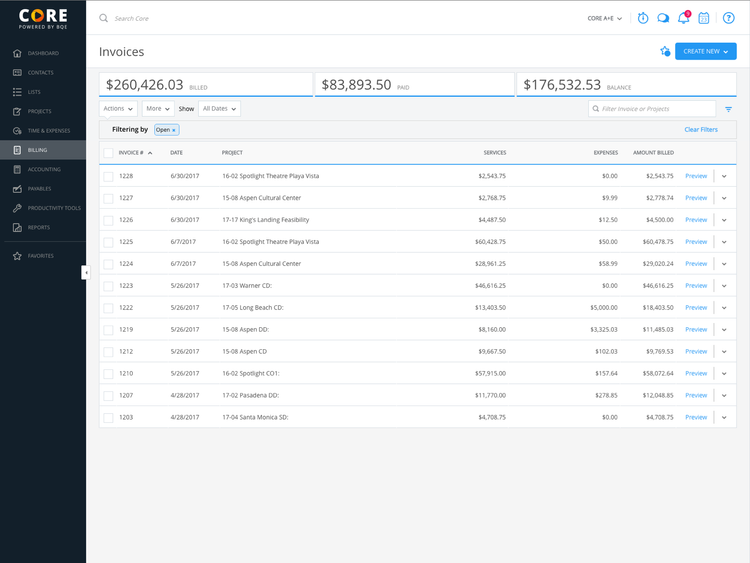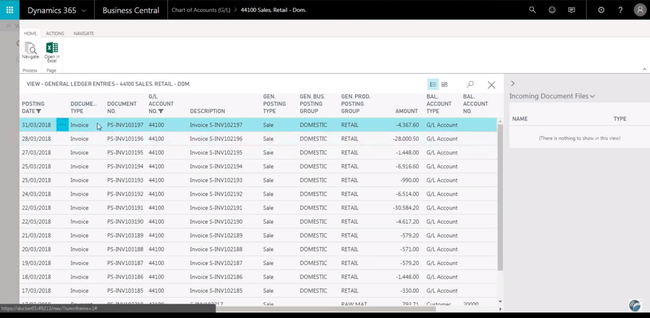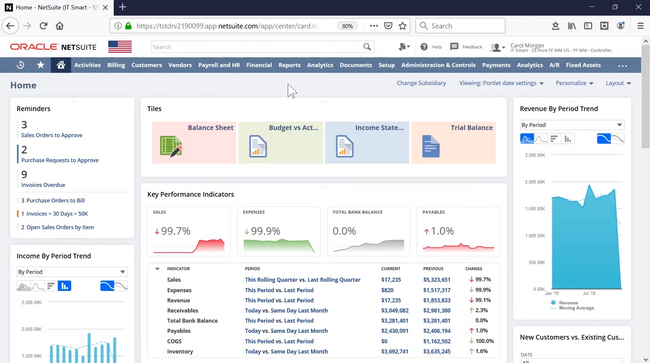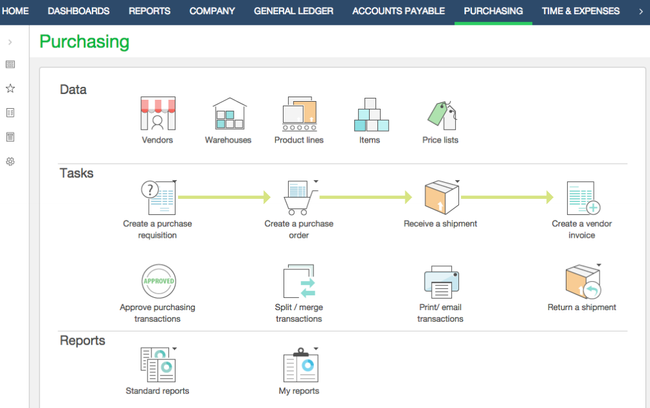Engineering accounting software is a financial management tool for project costing, billing, and budget management. Here’s our guide to the top solutions based on user reviews, our internal review process, and features like payroll and project cost management.
- Business Central: Best Overall
- NetSuite: Best Project Accounting Tools
- Sage Intacct: Best Multi-Entity Support
- Odoo: Best for Global Firms
- Deltek Vantagepoint: Best for Large Firms
- QuickBooks Enterprise: Best Payroll Management
- BQE CORE: Best for Smaller Firms
- Unanet ERP AE: Best Time-Tracking Tools
- AccountingSuite: Best Cloud Banking
1 Business Central - Best Overall
Why we chose it: Microsoft Dynamics 365 Business Central is our top overall pick because of its advanced project accounting. The software provides functionalities for detailed budget development and modification. It also supports better project management through timesheets, job costing, and reporting capabilities.
Additionally, Business Central optimizes resources through capacity and sales planning, tracking customer invoicing against planned or actual costs. We found its BI tools useful as well, providing live insights into project status, profitability, and resource-utilization metrics.
For accountants working within engineering firms, Dynamics 365 Business Central offers general ledger, accounts payable and receivable, and cash management features. The platform also provides data visualization through customizable reporting and dashboards. Accountants can consolidate and review their chart of accounts, balances, and journal entries across multiple companies within a single report, making it a solid choice for multi-entity firms as well.
2 NetSuite - Best Project Accounting Tools
Why we chose it: NetSuite’s project accounting tools are adept at handling the complex demands of engineering projects. We added NetSuite to our list because it integrates project activities with company financials, helping them monitor revenues, expenses, and profitability.
NetSuite’s project management complements its accounting capabilities, allowing users to monitor a project’s status from anywhere, at any time. Managers can view various metrics such as budgets, estimates, bookings, work in progress, percentage completion, invoices, billing milestones, and actual costs. The system supports various revenue scenarios on a project-by-project basis, providing a view into overall financial health through its connection to the general ledger.
Overall, NetSuite helps improve project completion records and reduce non-billable work hours. We think it’s a decent pick for firms requiring accounting, time tracking, and resource optimization in one solution.
3 Sage Intacct - Best Multi-Entity Support
Why we chose it: Sage Intacct offers multi-entity support for engineering firms with many branches and complex operations. Intacct made our list because it can handle various currencies, tax regulations, and reporting standards, making consolidating financials across the entire organization easier.
Notably, Intacct allows users to create reports and dashboards, including data from several locations in a single view. This is useful for engineering firms that need to monitor the performance of many projects or departments simultaneously. Intacct’s dimensional reporting allows firms to analyze their financial data across different dimensions without setting up a complex chart of accounts.
The software covers critical functions such as general ledger, accounts payable, and accounts receivable within a multi-entity framework. Last, Intacct delivers project accounting features for detailed cost tracking, project billing, and revenue management. This allows firms to accurately track project progress, manage budgets, and ensure profitability.
4 Odoo - Best for Global Firms
Why we chose it: We found Odoo best fits global engineering firms because it can adapt to any country’s requirements. Odoo provides fiscal localization packages, allowing businesses to start operations immediately without extensive setup for taxes, chart of accounts, and legal statements. This worldwide compatibility, combined with native iOS and Android apps, ensures firms can operate efficiently across different geographies.
Additionally, Odoo’s multi-company, -language, and -currency capabilities help manage international or distributed business units and subsidiaries. It boosts financial efficiency with flexible dashboards, reports, and analytics, offering detailed overviews or specific business activity insights. This level of detail and control is beneficial for engineering firms dealing with complex projects and financial structures; overall, we think Odoo is a decent choice for firms needing to monitor and manage several locations.
5 Deltek Vantagepoint - Best for Large Firms
Why we chose it: We picked Deltek Vantagepoint as the best solution for enterprises. For large A&E firms with over 250 employees, the system offers a unique blend of project management and productivity tools. For example, Vantagepoint has a built-in CRM system for maintaining client relationships and pursuing new opportunities, from lead management to proposal generation. We found this particularly useful for large firms looking to expand their portfolio.
Additionally, the software supports project planning and collaboration among team members. This includes risk management, milestone tracking, and document management. These tools complement Vantagepoint’s accounting features, handling everything from budgeting to cost control. For large engineering projects with many stakeholders and phases, this level of financial oversight prevents budget overruns and ensures the success of each project.
6 QuickBooks Enterprise - Best Payroll Management
Why we chose it: QuickBooks Enterprise is a solid pick for engineering firms needing built-in payroll management and accounting tools. The system offers various payroll services for firms with 50 or more employees, like auto payroll, same-day direct deposit, and W-2 forms processing.
We also found QuickBooks’ payroll reporting tool worth mentioning, enabling businesses to drill down into specifics like employee hours, earnings, and taxes withheld. This is useful for engineering firms that must maintain precise records and analyze labor costs for various projects.
Additionally, QuickBooks Enterprise provides access to many payroll integrations. These include workers’ compensation insurance through AP Intego, health and wellness benefits via SimplyInsured, and HR guidance from Mammoth, Inc. All accessible directly from the QuickBooks payroll account, these integrations help engineering firms manage essential employee benefits and compliance.
7 BQE CORE - Best for Smaller Firms
Why we chose it: We found BQE CORE best for smaller engineering firms upgrading from spreadsheets and basic accounting software to a fully integrated system. That’s because the platform’s highly scalable; users can opt for only the modules they need. The Foundations plan, priced per user, offers flexible billing, invoicing, project management, and time and expense tracking with DCAA compliance.
Additionally, if smaller firms need more advanced financial tools, they can purchase an annual subscription to the accounting module. These include auto-reconciliation for bank fees and credit cards, integrated deposits and fund transfers, and project, department, and company-level budgeting. BQE CORE’s accounting module also has a flexible and customizable chart of accounts and extensive reporting for profit and loss, balance sheet, and trial balance.
8 Unanet ERP AE - Best Time-Tracking Tools
Why we chose it: Unanet ERP AE made our list for its time and expense tracking features built to accommodate engineering firms. It offers capabilities like flexible rate tables, automated time and expense submission reminders, and line-item approval support. Overall, we found Unanet ERP AE more than sufficient for managing billing, job costing, and pay rates.
Unanet’s feature set covers project management, budgeting, team allocation, contract management, and financials in a centralized system. These capabilities include DCAA-compliant accounting and general ledger reporting. Additionally, Unanet has a built-in invoice designer with templates, billing adjustment wizard, and timesheets accessible from multiple devices.
9 AccountingSuite - Best Cloud Banking
Why we chose it: We added AccountingSuite to our guide because it connects to over 15,000 banks and credit card companies. This reduces the need for manual data entry and automates transaction syncing. The platform also provides basic tools like general ledger, accounts receivable, accounts payable, and customizable reporting.
AccountingSuite provides intelligent matching technology for swift reconciliation and advanced categorization. It also has strong data control features like multi-factor authentication and encrypted data. Finally, our demo of AccountingSuite includes inventory management capabilities and a module for generating invoices and sales orders, all accessible from a cloud-based platform.
What is Accounting Software for Engineers?
Engineering accounting software automates financial practices such as analysis, cost management, and payroll balancing. In addition to these core functions, engineering firms have several unique accounting priorities compared to other industries:
- Manage project schedules and budgets
- Time and expense tracking
- Customer and client invoicing
By using accounting software with this type of functionality, engineers can better prepare their financials for upcoming projects. Along with engineers, these industry-specific accounting solutions can be used by contractors, subcontractors, and architects.

Features of Engineering Accounting Software
- Core accounting: Cover all basic accounting functions like revenue and expense tracking; specific modules include accounts payable (AP), accounts receivable (AR), and a general ledger
- Payroll management: Automate all aspects of employee compensation, such as wage calculation, annual tax reports, and direct deposit or check printing
- Budgeting and forecasting: Coordinate financial planning activities for upcoming projects, then track and report on actual financial progress
- Project cost management (PCM): Estimate the cost of a project based on variables like time, labor, and expenses before work begins
- Billing and invoicing: Calculate, create, send, and manage outbound invoices to clients for services and products; set up one-time or recurring billing with automated payment reminders
- Inventory management: Track on-hand inventory as current assets on the balance sheet, then automate purchase orders to replenish low stocks; also measure equipment use over time as well
- Purchase orders: Create financial documentation for vendors when buying supplies or services based on product type, quantity, and pricing
- Financial reporting: Generate automated reports on various company financials, such as budget or payroll; create financial reports for your business

Best Accounting Software for Engineers Benefits
There are many benefits to using accounting software specifically for engineering firms:
Balance Project Schedules and Budgets
Engineering projects can take months or even years to complete. Having an accurate timeline and budget is essential before any work can begin. In fact, an initial estimate may be required with the Request for Information (RFI). Project managers with accounting software can streamline the job costing and estimation process necessary for establishing a clear budget.
Project cost management (PCM) tools help estimate the initial costs of a project. For example, you can track past equipment usage to determine if there may be any repair or maintenance expenses during the project. Knowing these numbers in advance can greatly reduce unexpected expenses further down the line.
Having a budget in place can then determine the project timeline by showing what work you can afford at any given time. If your firm’s payment plan is based on percent-complete billing, setting this schedule can help the client prepare their payment far in advance to meet all deadlines.
Time and Expense Tracking
Engineering firms need accounting software to calculate project costs far in advance. However, daily expenses and employee payroll can cause changes to those financial plans. Even with limited accounting experience, you can instantly review your company ledger at any time from any browser or mobile device.
Depending on the nature of your work, you’ll likely have to follow strict government regulations. Tracking adds to transparency when reporting on project compliance. Easy-to-share reports can be sent between different departments through the accounting software so everyone remains up-to-date on the latest financial information.

Streamline Customer and Client Invoicing
Billing clients is one of the final steps for engineering firms wrapping up a project. Billing and invoicing tools from accounting software make generating custom expense reports for every project easy. And software can automate the billing process to get invoices out to clients on a set schedule. This is particularly useful for firms using percent-complete billing practices.
As described above, accurate employee timesheets are essential for tracking billable labor. If independent contractors, subcontractors, or freelancers are involved in a specific project, you can use accounting software to accurately calculate payment for their services.
Additional Software Integration for Engineering
Accounting software contains a lot of different modules and applications for services beyond basic financing. For other areas, these systems can integrate with several other types of software to fully streamline your back-office processes, such as:
- Enterprise resource planning (ERP)
- Billing
- Time tracking
- Project management
- Customer resource management (CRM)
- Human resources (HR)
Combining all of these systems with accounting software will make running your engineering firm easier than ever before.
Engineering Accounting Software Deployment Options
Accounting software can be deployed on-premise at your business or through a cloud-based platform. Your chosen deployment model will depend on what works best for your company. Additionally, there are hybrid deployment models available which combine on-premise and web-based solutions.
On-premise solutions are known for their extra security, since they are controlled directly by your company. Enterprise-level firms all the way down to independent contractors may prefer to keep their financial data stored on-premises.
Cloud-based systems can be accessed from any mobile device with Internet access, making this beneficial for making real-time changes to product data. This is useful for engineering firms with multiple field offices. And these applications are remotely accessible on iOS and Android mobile devices.
























































